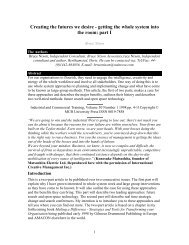From Old Economics to New Economics- Radical ... - Bruce Nixon
From Old Economics to New Economics- Radical ... - Bruce Nixon
From Old Economics to New Economics- Radical ... - Bruce Nixon
You also want an ePaper? Increase the reach of your titles
YUMPU automatically turns print PDFs into web optimized ePapers that Google loves.
have highlighted the ‘care’ aspects of the core economy, and others such as Edgar Cahn have<br />
broadened the concept considerably:<br />
Who teaches children <strong>to</strong> walk To talk To obey the rules To tell the truth To avoid harming<br />
themselves To avoid harming others Who produces a workforce that gets up in the morning, gets<br />
places on time, and knows it is wrong <strong>to</strong> steal and lie Mothers, fathers, grandparents, families and<br />
those institutions that impart moral values. 29<br />
Furthermore, the quantity and nature of motiva<strong>to</strong>rs of behaviour derived from moral values –<br />
relative <strong>to</strong> that of self-interest – can strongly influence the form of society and economy that<br />
we have, particularly with regard <strong>to</strong> cooperation vs. competition:<br />
The relationship between social bonds and competition is curvilinear; weak bonds are one fac<strong>to</strong>r that<br />
allows all out social conflict; tight bonds will restrain, if not suppress, competition. 30<br />
Thus an economic system that favours cooperation over competition in many instances<br />
requires relatively tight social bonds, or shared values or morals in order <strong>to</strong> function.<br />
Moreover, it is important that the formation of these is separated from the economic sphere: if<br />
this is not the case, then commercial imperatives come <strong>to</strong> dominate and themselves shape<br />
people’s sense of their ‘moral commitments’. That is, a pure focus on people’s response <strong>to</strong><br />
financial incentives may, over time, fatally undermine the countervailing principles of<br />
morality.<br />
‘Doing the right thing’ and ‘looking out for yourself’ become one and the same thing:<br />
Neoclassicals tend <strong>to</strong> design institutions for knaves, either assuming that all people are knaves or that<br />
those who wish <strong>to</strong> be “good” will do so anyhow, but the others need <strong>to</strong> be paid or punished…such<br />
policies undercut the “good” or normative, voluntary behaviour. Thus, if volunteers read <strong>to</strong> blind<br />
patients in an institution, but its administra<strong>to</strong>rs, anxious <strong>to</strong> secure a more reliable service, will pay for<br />
some such reading, one would expect that under such circumstances volunteer reading will cease,<br />
exacting a sizeable cost for what increase in reliability is attained. 31<br />
For socio-economists, this leads <strong>to</strong> specific policy proposals:<br />
The policy point is that one needs <strong>to</strong> work not merely on the cost-benefit, deterrence, incentive and<br />
police side, but also on the formation of preferences side, via moral education, peer culture, community<br />
values and the mobilisation of appropriate public opinion. Fac<strong>to</strong>rs that neoclassicists tend <strong>to</strong> ignore,<br />
because they take preferences for granted. 32<br />
If then we are all ‘conflicted’, all have the potential <strong>to</strong> be Dr Jekyll as well as Mr Hyde, the<br />
task is <strong>to</strong> encourage behaviour that is good for society and discourage that which is not.<br />
Ruskin, Schumacher and the ecological economists have taught us <strong>to</strong> value that which<br />
enhances the well-being of individuals and communities, and is in harmony with the natural<br />
world and environmental sustainability. Institutional economists demonstrate that people’s<br />
‘preferences’ – their ‘wants, desires and values’ – are not fixed, but are shaped by the<br />
institutional framework in which we live. Thus in a world where the pursuit of ever-higher<br />
levels of income dominates, and capitalism must create and recreate ‘demand’, commercial<br />
values come <strong>to</strong> both constrain the choices that people see as feasible and <strong>to</strong> incentivise them<br />
within these narrow parameters. We are, <strong>to</strong> a considerable extent, thus ‘conditioned’ <strong>to</strong> act in<br />
29 Cahn (2001)<br />
30 Etzioni (1988)<br />
31 Ibid.<br />
32 Ibid.<br />
29



